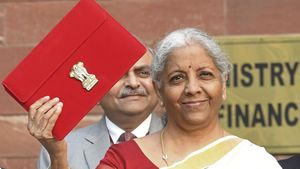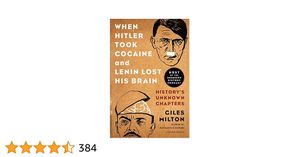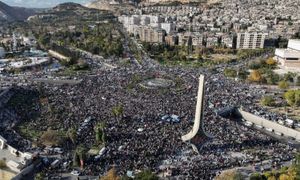Germany is at the crossroads of political contention as the Christian Democratic Union (CDU), led by Friedrich Merz, collaborates with the far-right Alternative for Germany (AfD) to push for strict immigration measures. This unprecedented partnership has ignited mass protests across the nation, particularly against the backdrop of approaching elections scheduled for February 23, 2025.
Large crowds recently demonstrated against the CDU and its sister party, the Christian Social Union (CSU), for their willingness to work with the AfD on anti-immigrant agendas. A nonbinding motion supported by both parties aims to allow the rejection of asylum seekers at Germany's borders and to ease deportations. Uta Fuchs, one of the protestors from Dresden, expressed horror at the cooperation, stating, “I find it simply inconceivable, because, yes, for the first time since 1932, no, 1945, this is the first time... exercised power here and this must not be allowed to happen...”.
Since the end of World War II, German political discourse has revolved around preventing the far-right from taking part in government, establishing what is known as the 'firewall' against extremist parties. Merz's actions have dismantled this consensus, as he drove forward immigration reform measures with AfD backing. Chancellor Olaf Scholz, representing the Social Democrats (SPD), decried this shift, saying, “The firewall has fallen.” He condemned the collaboration as the end of decades of consensus against giving power to the extreme right.
The planned mid-February elections have propelled these immigration discussions to the forefront, with many conservatives taking advantage of recent violence attributed to asylum seekers to push their agenda. Following alarming incidents, such as the tragic knife attack against kindergarten children, where the suspect was previously scheduled for deportation, public sentiment has shifted. Merz now argues for strict immigration controls as part of his party’s election strategy following public outcry and safety concerns.
Earlier this week, Merkel, who has largely remained silent post-retirement, emerged with pointed criticism of Merz's decisions, accusing him of breaking promises not to engage with extremist factions. She stated Merz was “wrong” to deviate from the CDU's long-held position against working with parties like the AfD. This discord reflects deep divisions not only within the CDU but also across the German electorate.
Polling data from recent surveys indicates public sentiment is split, with about 47% of voters finding the coalition with AfD acceptable, whereas another 47% oppose the collaboration. Alarmingly, 71% agree with the sentiment of the AfD representing a threat to democracy. This polarizing dynamic is evident as more Germans grapple with the consequences of intensified immigration discourse.
The political strategy employed by Merz emphasizes addressing immigration concerns via direct action, prioritizing security and law enforcement solutions. His determination to detach the CDU from Merkel’s centrist policies has made waves, especially as he seeks to capture and appeal to voters traditionally aligned with the AfD.
After another failed attempt to legislate stricter immigration policies, during which the proposed bill failed to pass, Merz asserted his resolve to continue pushing, declaring, “the people out there who are listening and watching ... don't want us to argue among ourselves about the AfD. They want us to find solutions.” This repeated emphasis on direct action marks Merz’s bid to reclaim unity and authority among his constituents amid fierce criticism.
Politicians across the spectrum are concerned about the normalization of AfD’s rhetoric and policies within mainstream parties, fearing long-term consequences. Scholz and other opposition leaders have cautioned about the dangers of radicalizing the political climate, with some going so far as to issue dire warnings, saying, “You have to put up the firewall again!” illustrating the tension and urgency surrounding the discourse on immigration reform.
Analysts argue this situation could solidify the AfD's credibility if prominent parties continually co-opt their policies, leading to future governmental participation. The emergence of the AfD as a significant political player, even through indirect means like parliamentary votes, is reshaping longstanding political structures and alliances within Germany.
With merely weeks to the February 23 elections, the ramifications of this collaboration will be deeply felt as the political atmosphere grows more charged. The decisions made now will not only influence the immediate political framework but may also have lasting impacts on German society and values.



